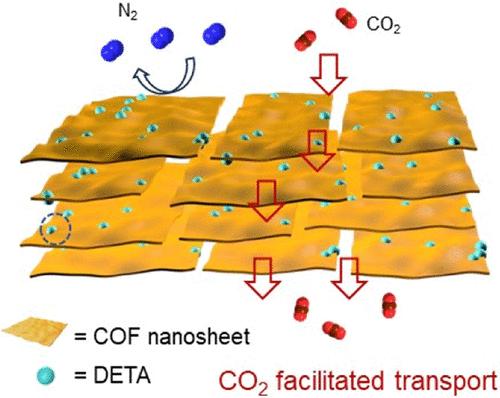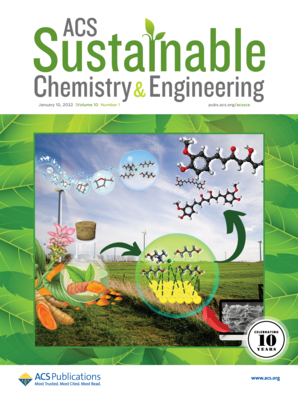An Ionic Covalent Organic Framework Membrane with Confined Mobile Carriers for Stable and Efficient Carbon Dioxide Capture
IF 7.1
1区 化学
Q1 CHEMISTRY, MULTIDISCIPLINARY
引用次数: 0
Abstract
Membrane-based postcombustion carbon capture is a promising method for reducing carbon dioxide (CO2) emissions. Mobile carrier-facilitated transport membranes (FTMs) are receiving attention because they can simultaneously increase CO2 permeability and CO2/N2 selectivity. However, FTMs still face the challenge of carrier loss. Stable immobilization of mobile carriers is essential for achieving and maintaining superior separation performance of FTMs. Herein, we report an ionic covalent organic framework (COF) membrane with confined mobile carriers for stable and efficient CO2 separation. In this structure, a typical CO2 mobile carrier, 2,5-diethylenetriamine (DETA), is stabilized in the negatively charged nanochannels of the COF membrane. Thanks to the intrinsic CO2-facilitated transport of DETA, the COF membrane presents a CO2 permeance of 2347 GPU and a CO2/N2 selectivity of 191 under simulated flue gas conditions. Because the CO2 mobile carriers are firmly confined within the pores through electrostatic interactions, the membrane shows stable separation performance during the 310 h continuous test. The excellent performance and robust stability demonstrate the significant potential of this innovative membrane structure for practical use in the capture of CO2 from flue gas.

一种具有受限移动载体的离子共价有机框架膜,用于稳定和高效的二氧化碳捕获
基于膜的燃烧后碳捕集是减少二氧化碳(CO2)排放的一种很有前景的方法。移动载体促进传输膜(FTMs)因其可同时提高二氧化碳渗透性和二氧化碳/氮气选择性而备受关注。然而,FTM 仍面临载体流失的挑战。移动载体的稳定固定对于实现和保持 FTM 的卓越分离性能至关重要。在此,我们报告了一种离子共价有机框架(COF)膜,该膜具有封闭的移动载体,可实现稳定高效的二氧化碳分离。在这种结构中,典型的二氧化碳流动载体--2,5-二乙烯三胺(DETA)被稳定在 COF 膜的带负电的纳米通道中。由于 DETA 本身具有促进二氧化碳传输的特性,在模拟烟气条件下,COF 膜的二氧化碳渗透率为 2347 GPU,二氧化碳/氮气选择性为 191。由于 CO2 流动载体通过静电作用被牢牢地限制在孔隙中,因此在 310 小时的连续测试中,该膜显示出稳定的分离性能。优异的性能和强大的稳定性证明了这种创新膜结构在烟道气中捕集二氧化碳的实际应用中具有巨大潜力。
本文章由计算机程序翻译,如有差异,请以英文原文为准。
求助全文
约1分钟内获得全文
求助全文
来源期刊

ACS Sustainable Chemistry & Engineering
CHEMISTRY, MULTIDISCIPLINARY-ENGINEERING, CHEMICAL
CiteScore
13.80
自引率
4.80%
发文量
1470
审稿时长
1.7 months
期刊介绍:
ACS Sustainable Chemistry & Engineering is a prestigious weekly peer-reviewed scientific journal published by the American Chemical Society. Dedicated to advancing the principles of green chemistry and green engineering, it covers a wide array of research topics including green chemistry, green engineering, biomass, alternative energy, and life cycle assessment.
The journal welcomes submissions in various formats, including Letters, Articles, Features, and Perspectives (Reviews), that address the challenges of sustainability in the chemical enterprise and contribute to the advancement of sustainable practices. Join us in shaping the future of sustainable chemistry and engineering.
 求助内容:
求助内容: 应助结果提醒方式:
应助结果提醒方式:


